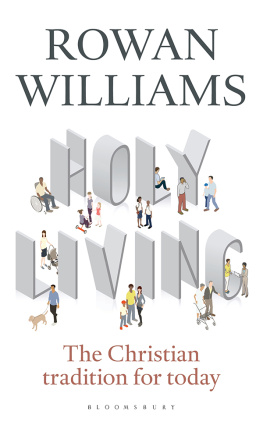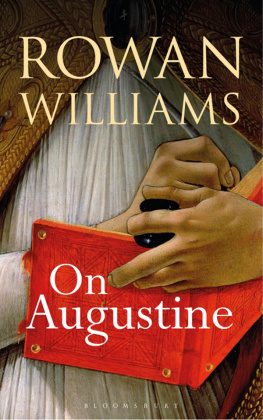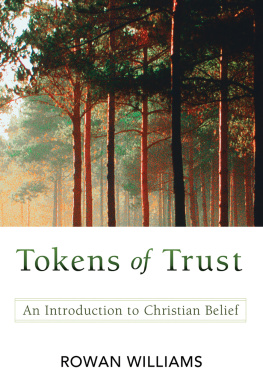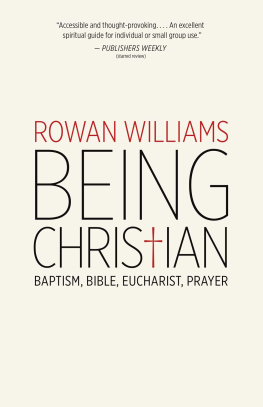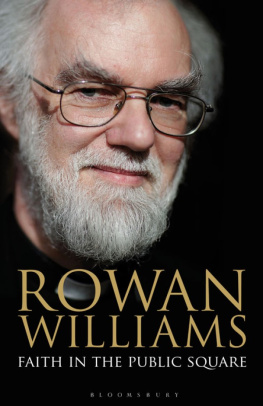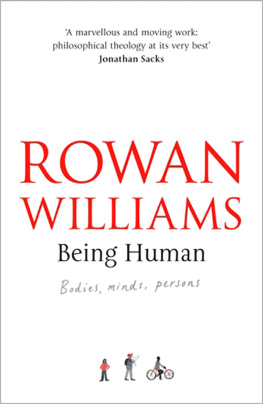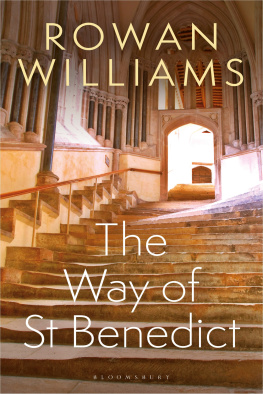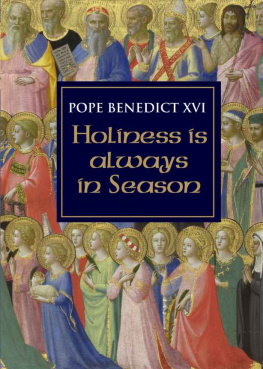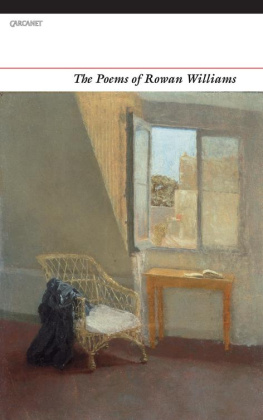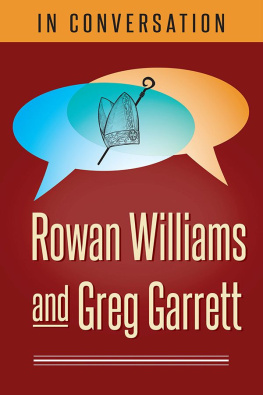
HOLY LIVING

You come out of a memorably good production of a play or a memorably good programme of music, and you talk about it with the people you are with. Did you notice how she handled that moment in the second movement? What about the way he repeated the last line of the last verse? Did you hear his voice rising on that line? Wasnt the break in her voice powerful in the last scene? Youre not an actor or a singer or an instrumentalist, and neither are your friends and family; perhaps at best you know youd like to be able, in an ideal world, to do something like that. But you all have in different degrees of articulacy some sense of how it works, and an eagerness to explore the mystery and understand it better. You want to get a slightly better grasp of why these moments affect you, change you, open up new possibilities of living in the world.
The only excuse for writing about holiness or about holy lives is something to do with all this. Its a way of pointing to those lives in which something works, some wholeness comes through; lives that come across like a brilliant performance of the music or drama of Gods action. It helps to notice and think about this or that detail, this or that transition, even as you recognise how far you are from realising it yourself. And as with talking about the play or the concert, what matters finally is the text or the music not the performers as things in themselves. You have come away with an enhanced joy in the whole composition, and your appetite is whetted for the next (and probably very different) performance. So, too, the holy life kindles your engagement with the work itself, the divine action unfolding in the world, and you become a little better at spotting the signs of another great performance. And much more than in the conversation outside the theatre you set your teeth and hope that the reality the story or picture of a holy life points you to will sink in rather deeper and make a difference in you.
Great performances point us to the integrity, joy and demandingness of the whole work. Holy lives point us to the scope and beauty of Gods action. And writing or talking about holy lives points to the reality of God coming alive in human words and human bodies. People who write and talk about these things are quite often, like the writer of these words, a very long way indeed from that fullness of life; but they are persuaded that its worth trying to point: to invite others to be made fearful and joyful that the possibilities of faith are made actual, that the work is indeed performable.
These essays range in style and subject, from general reflections on what it might mean to live more consciously and prayerfully in Gods presence in and as our bodies, or on what is and isnt involved in trying to know ourselves, through to more specific studies of particular holy figures, their teaching and example: Benedict advising his sixth-century community; Julian of Norwich blithely turning a set of theological assumptions inside out to underline more completely the newness of Gods revelation in Jesus; Teresa of Avila exploring how the Bible makes sense of the lives of herself and her sisters, and how the Eucharist makes sense of the God whose work and nature they try to communicate in their daily life. They are essays about how we seek to live honestly and consistently in a community whose purpose is to be sacramental, to show the embodied effect of Gods gift to humanity in Jesus, and how we seek to be just as honestly and consistently listeners, quiet enough to learn how to tune in to what God wants us to hear in the words of the Bible. They span several decades of attempting to point to those places where the Gospel becomes credible, in lives disturbed and healed by God so that they let the light of Jesus Christ come through. Writer and reader may well feel like the group walking away from the theatre: I long to live with that integrity, and I can see just enough of how it comes to be to make me want to understand more. I hope, quite simply, that pointing to these ideas and these lives and teachings will help to open hearts to the depth of judging and transforming joy that the drama and music of Gods act sets before us.
Rowan Williams
Cambridge, Lent 2017
Who is weak and I do not feel weak?
2 Cor. 11.29
Can you drink the cup I drink?
Mk. 10.38
Christ is killed every day by the injuries that we cannot bear. He has borne our griefs and carried our sorrows and our first emotion, our first reaction is relief. Christ who lifts responsibility from us, Christ who suffers for us, Christ who takes away our burden and our misery, who stands between us and the worlds dreadfulness, between us and the squalor of our lives, as he was once thought to stand between us and the wrath of his Father. Christ the substitute, Christ the surrogate, Christ who saves us the trouble of being crucified. God will forgive: that is his job; Christ will suffer: that is his. That great and highly uncomfortable saint, Raymond Raynes, once described the aim of most Western European religion as being, to shut up sacrifice in Jesus alone and not let it pass to us. Can you drink the cup I drink or be baptized with the baptism I am baptized with? Less passionate than James or John or more honest we answer, No. No, Lord, your cup is yours alone; far be it from us to presume to share it. By the grace of God we know our limitations.
And so Christ is killed every day by the injuries we refuse, by what we will not let ourselves feel and know, by the risks we refuse, the involvement we refuse. The Gospel tells us of some who knew their limitations: a rich young man, a dutiful son who returned to bury his father, a secret disciple who emerged to bury Jesus himself, the nameless followers who walked no more with him, two clergymen on the road to Jericho, and a man by the name of Judas Iscariot, the son of Simon. No, not one of them is condemned; they are rational men who have taken the Lords advice and counted the cost. They know more about discipleship than the eager hearers of the Word who press forward to offer their services with adolescent enthusiasm. To such, as to James and John, Jesus addresses those flat and bitter words, You dont know what you are asking.
Yet it is the realists who are the murderers of Christ. It is the Grand Inquisitor who has calculated the cost of discipleship to the full, who has taken every step towards Christ except the last: it is he who is the greatest enemy of Christ. Behind Pilate stands the compassionate and far-sighted Caiaphas; behind Caiaphas stands Judas; behind Judas, the rich young ruler. The midnight session of the council that sent Jesus to his death is the great conspiracy of reasonable people in every age, of people who know their limitations. Jesus in Gethsemane is left alone and unsupported in his tortured prayer, because the apostles who once perhaps thought they understood have decided that they cannot go with him into that desert and sensibly have gone to sleep. Agape in the older translation bears all things (2 Cor. 13.7) and bears them alone. I looked, but there was no one to help (Is. 63.5). For the reasonable person, in the humility of their realism, declines the bloody and compromising struggle.
Well, we are all realists to a greater or lesser degree, and there is therefore no avoiding the fact of our complicity in the death of Jesus. Like the apostles we evade and refuse and deny and escape when the cross becomes a serious possibility. Terror of involvement, fear of failure of hurting as well as being hurt the dread of having our powerlessness nakedly spelled out for us: all this is the common coin of most of our lives. For beneath the humility of the person who believes he or she knows their limitations is the fear of those who have never found or felt their limitations. Only when we have travelled to those stony places of the spirit where we are forced to confront our helplessness and our failure can we be said to know our limitations, and then the knowledge is too late to be useful. We do not know what we can or cannot bear until we have risked the impossible and intolerable in our own lives. Christ bears what is unbearable, but we must first find it and know it to be unbearable. And it does not stop being ours when it becomes his. Only thus can we translate our
Next page
